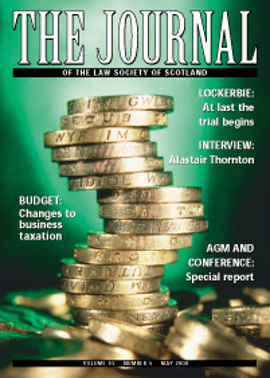When clients ask and expect too much
It is a particularly concerning feature of the Master Policy claims experience that there are claims which have arisen because of the actions of clients who are devious, dishonest or fraudulent. If solicitors are to avoid falling foul of such clients, they need to be vigilant and suspicious when accepting instructions.
Devious clients
The Master Policy claims experience includes the following situations in which solicitors were persuaded to take a course of action which was ill-advised and resulted in the intimation of claims against the solicitor concerned.
Executry - An intestate executry where a family member insisted, erroneously, that he/she was the sole surviving relative of the deceased and therefore entitled to be appointed executor and therefore entitled to the entire estate. The neglected heirs surfaced after the estate had been paid over. While it is difficult to exclude this risk altogether, it does demonstrate that you cannot safely accept certain instructions at face value and need to make certain enquiries and see evidence to support what the client is saying.
Commercial property - The submission of an offer for a valuable property in the name of a client’s company. The company proved not to have been incorporated and the client disappeared/was not capable of fulfilling the obligations in the Missives. Since the offer was submitted on behalf of a non-existent principal, the solicitor’s firm was liable to implement the Missives.
Loan transactions where the solicitor has a responsibility to protect the interests of both borrower and lender and the borrower has prevailed upon the solicitor to remit loan monies for unapproved purposes resulting in a claim from the lending institution.
Loan transactions - cases have occurred in which the borrower has persuaded the solicitor to accept at face value as being the genuine and effectual signature of a spouse/guarantor. The lending institution’s position was prejudiced and, on the particular facts of these cases, the lending institutions had a claim against the solicitor.
Dishonest/fraudulent clients
Even more distressing is the fact that solicitors have been “used” by dishonest and fraudulent clients and third parties to facilitate a range of different types of fraud - frauds on lending institutions, scams, money laundering. In his article in the August 1999 issue of the Journal (p 35), Leslie Cumming, Chief Accountant at The Law Society of Scotland, reviewed various types of fraudulent scheme in which solicitors have been implicated, the warning signs and how solicitors should respond. Leslie Cumming’s article is reprinted here.
In this issue
- President's report
- Marketing Advisory Service
- Developers have human rights too
- What difference will the Human Rights Act make?
- Preparing reports for the court in family actions
- Let's talk about money!
- Reservations about frivolous grounds of appeal
- Contention over confidential soundings
- Standard instructions for domestic conveyancing
- Making money on the web
- When clients ask and expect too much






